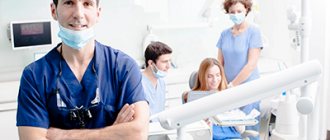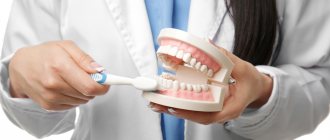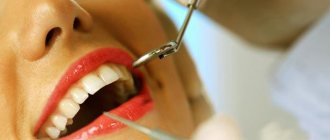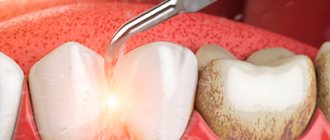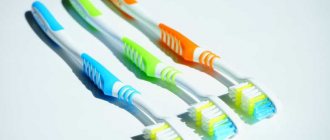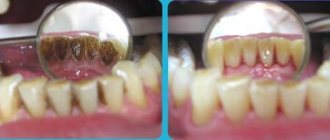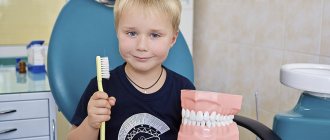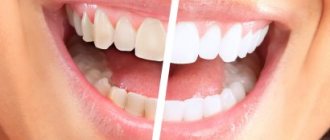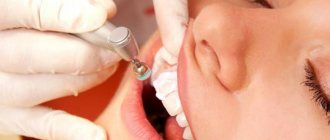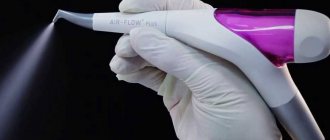01.12.2019
Every preschooler knows exactly how many times a day he needs to brush his teeth - twice: in the evening and in the morning. But not everyone knows about the existence of exceptions to this rule and about the correct technique for carrying out the hygiene procedure. This will be discussed in the article.
What it is?
Professional teeth cleaning means removing hard and soft plaque from teeth, as well as polishing them. Therefore, the procedure usually consists of two parts, and various methods can be used to remove the stone, for example:
- mechanical;
- ultrasonic;
- laser:
- sandblasting (Air Flow);
- using the VECTOR device.
In serious cases, the dentist may use a combination of several methods. Most often, ultrasonic cleaning is done, and then for final polishing, Air Flow is used.
In addition to caring for your teeth, professional cleaning takes care of the condition of your fillings and polishes the filling material. This allows you to preserve the original color of the filling and prevent its destruction.
During the manipulation process, the dentist performs a hardware removal of all excess from the tooth enamel and removes particles from the oral cavity. At the end, a protective fluoride varnish is applied, which reduces tooth sensitivity and contributes to the long-term preservation of the light tone of the enamel and the smoothness of each tooth.
Irrigator
You can also perform dental hygiene using another special device. It is an irrigator. The operating principle of such a device is quite simple. It cleanses the oral cavity of food debris and microorganisms accumulated in it using water pressure.
How to use an irrigator - a device for cleaning teeth? To do this, just select the mode and pressure power on it. After turning on the device, the water jet will perfectly clean the interdental space, reduce the risk of caries, and also have a massage effect on the gums, improving tissue metabolism and blood circulation. The duration of the procedure is 3-10 minutes. This time is enough for the device to complete its main tasks.
Should I brush my teeth?
The question of whether it is worth having professional teeth cleaning or using home remedies may be of interest to almost every person. To understand the need for such a procedure, you should know how plaque is formed.
Even if you carefully follow your dentist’s recommendations and brush your teeth regularly, ideally after every meal, using a toothbrush and the best toothpaste can only remove soft plaque. And even with the correct movements and careful work of the brush, there may be hard-to-reach places in the dentition where, in a short period of time, plaque is mineralized by calcium salts, which are contained in human saliva. As a result, hard plaque (tartar) forms, which cannot be removed at home.
Tartar is made up of bacteria that cause serious dental disease and can lead to the loss of one or more teeth. In addition, the stone is dark in color, so teeth lose their natural whiteness with plaque.
The peculiarity of the formation of tartar is that as soon as the first film appears on the teeth, the process accelerates significantly. The surface of the tooth enamel becomes rough, so various microorganisms easily stick to it. In addition to losing a beautiful appearance, a person develops bad breath.
To get rid of tartar and restore natural whiteness, you need to have your teeth cleaned in a clinic. Only a specialist with dental equipment can effectively remove plaque and tartar, polish and subsequently care for teeth.
How much does it cost to brush your teeth too often?
More than twice. Dentists recommend not to get carried away with brushing your teeth for several reasons. The first is that the bristles of a toothbrush can mechanically damage the enamel, which leads to microcracks. In the future, this leads to the destruction of the tooth as a whole. Often, this happens after using a brush that is too hard. The enamel wears away, leaving the tooth even without natural protection. The second reason is that the active substances in toothpaste increase the sensitivity of the enamel, irritating the gums and mucous membranes. As a result, the gums swell and bleed more often.
If frequent brushing of your teeth is a method of getting rid of an unpleasant aftertaste after eating, then you need to get into the habit of using mouth rinse or chewing gum. Acidic foods weaken enamel—another reason to refrain from brushing your teeth frequently.
How often should I clean?
Dentists have a unanimous opinion on the issue of frequency of teeth cleaning. The procedure should be performed 1-2 times a year, but not more often, so as not to damage the enamel.
It is necessary to take into account the individual characteristics of the body - for some it is enough to clean the stone once a year, while for another person plaque formation occurs faster, and he needs to visit the dental clinic once every six months.
In addition, professional teeth cleaning is indicated before prosthetics, implantation and dental treatment, as well as before teeth whitening. A clean tooth surface will allow the dentist to do his job better:
- better choose the color of the filling, crown or veneer;
- notice the onset of caries in time;
- prevent many gum diseases;
- achieve good treatment and whitening results.
This manipulation is recommended for those people who smoke and often drink drinks with dyes (tea, coffee, wine, etc.).
Frequency of procedures
How many times should you brush your teeth? Dentists recommend doing this twice a day. The optimal time for carrying out this procedure is morning and evening hours. If you follow this regimen, it becomes possible to keep your mouth properly clean around the clock.
Until relatively recently, it was believed that the best option was to brush your teeth three times a day. However, as a result of the ongoing research, it turned out that with excessive mechanical impact on the enamel, it becomes thinner. This has been confirmed by accumulated clinical experience. That is why dentists have come to the conclusion that the desired amount of hygiene procedures is twice a day.
Cleaning methods
Currently, dentists offer several methods for cleaning teeth. The oldest is mechanical, when tartar is destroyed using a special tool in the form of hooks. This method can injure your gums, so it is rarely used.
One of the progressive methods is ultrasound. Cleansing is carried out using an ultrasonic scaler. Stones are destroyed by sound vibrations of a certain frequency, while plaque is removed and supragingival and subgingival pockets are cleaned. The doctor can use attachments of different sizes, depending on the complexity of the treatment area and the thickness of the plaque. In addition, during the work, water or an antiseptic is supplied to the oral cavity, which removes stone particles through a dental saliva ejector. The patient does not feel pain, but if the necks of the teeth are sensitive, the doctor administers local anesthesia.
Modern laser systems allow not only to remove the hardest tartar, but also to whiten teeth. The device causes the evaporation of moisture contained in plaque and removes deposits from the enamel in layers. At the same time, the enamel receives a lighter shade, and the achieved result of a snow-white smile will last for several years. The procedure is absolutely painless, but for certain categories of patients there are contraindications.
The latest Swiss technology Air Flow makes it possible to remove particles of plaque, stone and pigments in hard-to-reach places, clean subgingival pockets and polish enamel. Treatment is carried out with a jet of cleaning mixture, which consists of sodium bicarbonate and water. Under high pressure, this composition is applied to each tooth. Regular baking soda acts as an abrasive. This sandblasting method allows for high-quality hygienic treatment, removing all excess from the teeth, achieving a smooth surface of the tooth enamel and its natural lightening. The manipulation is painless and pleasant for the patient. The result is a Hollywood smile and clean teeth.
The VECTOR device is the latest word in dentistry. It is intended for the prevention and treatment of periodontitis and acts by vibration. This technique takes advantage of ultrasonic waves and the active action of a fluoride and calcium based cleaning mixture. Using such equipment, the doctor removes deposits and bacteria, cleans subgingival pockets and polishes tooth enamel.
Modern people have a wide choice of professional hygiene methods. A consultation with a dentist will help you choose the most suitable one.
Indications and contraindications
Teeth cleaning in a dental clinic is recommended for everyone, but those people who:
- have installed permanent dental structures (braces, veneers, crowns, implants, etc.);
- are going to undergo professional teeth whitening;
- planning prosthetics or dental treatment;
- smoke;
- drink a lot of drinks that have a coloring effect (coffee, tea, etc.).
If there are certain health problems, a person cannot use any of the teeth cleaning methods offered by dentists, but if necessary, you can choose another option. For example, temporary contraindications include:
- inflammation of the oral mucosa;
- ARVI, bronchitis or other diseases that make nasal breathing difficult;
- pregnancy and breastfeeding period.
In such cases, professional teeth cleaning can be done after such reasons have ended.
General contraindications include the following health problems:
- arrhythmia and other heart diseases;
- asthma;
- increased sensitivity of teeth;
- allergic reactions;
- tuberculosis;
- hepatitis;
- various infectious diseases;
- epilepsy, etc.
Such manipulations are not performed on children and adolescents; if necessary, stone cleaning can be carried out if permanent teeth are present (over the age of 12 years).
Choosing a toothpaste for a child
Children's pastes have a lighter and softer composition. These are non-abrasive pastes with a pleasant taste, created specifically for children's enamel of baby teeth. For children under 3 years old, hypoallergenic pastes without fluoride are produced, and at the age of 4–7 years it is already necessary to add this component to strengthen the enamel. In the period up to 12 years, the amount of fluoride decreases again - these pastes already resemble adults in composition.
It is best to entrust the choice of toothpaste for a child to a dentist who has been observing the child from an early age. All children have their own characteristics - so it is the doctor who will select the paste that is really suitable.
What not to do after prof. cleaning?
When a person has spent time and money, visited a dentist and received an excellent result in the form of clean teeth and a snow-white smile, the desire to preserve all this for a longer time becomes understandable. Therefore, it is important to follow the following general recommendations:
- do not eat or drink (especially drinks with dyes) for 2 hours after the procedure;
- Replace an old toothbrush that contains bacteria with a new one;
- for 7 days, eat less foods that can stain tooth enamel (coffee, wine, tea, etc.);
- rinse your mouth after every meal;
- regularly brush your teeth with the correct movements, use special threads;
- Go to the dentist once every six months.
Why is it necessary to brush your teeth?
When you wake up, do you feel an unpleasant taste in your mouth? This is because small pieces of food get stuck between the teeth. Food debris affects the inflammatory process in the gums. By not brushing your teeth in the evening, you contribute to acid imbalance. During sleep, the regular production of saliva is suspended, which serves to further multiply bacteria.
Liquid intake also affects oral hygiene. For example, according to statistics, of all existing drinks, people most often drink black tea and strong coffee. Both drinks stain the enamel yellowish.
